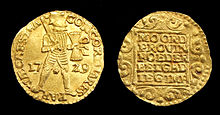

"Unity makes strength"[n 1] is a motto that has been used by various states and entities throughout history. It is used by Belgium, Bulgaria, Haiti, Malaysia and Georgia on their coats of arms and is the national motto of Belgium, Bolivia, Malaysia, Georgia and Bulgaria.
The phrase was first used as national motto by the Dutch Republic. However its use predates the republic's independence, appearing for example as part of mottos and proverbs known as Gemeene Duytsche Spreekwoorden, which was published in 1550, back when the place was under the Habsburg empire of Charles V, which ruled over modern day Netherlands and Belgium. This was derived originally from a Greek phrase (ἰσχύς ἐν τῇ ἕνώσει, iskhús en têi henṓsei, lit. 'power lies in unity') attributed to Homer, dating to roughly 850 BC,[citation needed] that later appears similarly in the Latin phrase concordia res parvae crescunt ("small things flourish by concord"), which was used in the Bellum Jugurthinum of Roman Republican writer Sallust.[1]
The similar moral of the Aesopic fable "The Old Man and his Sons" has been rendered in various related ways: "All power is weak unless united" (1668),[2] "Unity makes strength, strife wastes" (1685),[3] "Strength lies in union" (1867),[4] "Strength is in unity" (1887),[5] "Unity is strength" (title), "Union gives strength" (moral) (1894),[6] "Union is strength" (1912),[7] "In unity is strength" (1919);[8] although older versions are more specific: "Brotherly love is the greatest good in life and often lifts the humble higher" (2nd century),[9] "Just as concord supplies potency in human affairs, so a quarrelsome life deprives people of their strength" (16th century).[10]
Cite error: There are <ref group=n> tags on this page, but the references will not show without a {{reflist|group=n}} template (see the help page).
- ^ Bellum Iugurthinum, Chapter 10. Full quotation: nam concordia parvae res crescunt, discordia maxumae dilabuntur ("concord will make small things flourish, discord will destroy great things"). It also appears in Seneca the Younger's Letters to Lucilius (XCIV, 46).
- ^ "Toute puissance est faible, à moins que d'être unie", Jean de La Fontaine, "Le Vieillard et ses enfants" 1668
- ^ Pieter de la Court, "Een Boer ende seeven twistende Soonen", Sinryke Fabulen, Amsterdam, 1685, pp.599-608
- ^ Edward Garrett, London, 1867, pp.83-4
- ^ W.J. Linton (1887). Baby's Own Aesop.
- ^ Joseph Jacobs, The Fables of Aesop, 1894.
- ^ V.S. Vernon Jones, Aesop's Fables: A New Translation, 1912.
- ^ Aesop for Children, 1919
- ^ Babrius
- ^ Hieronymus Osius Fable 53